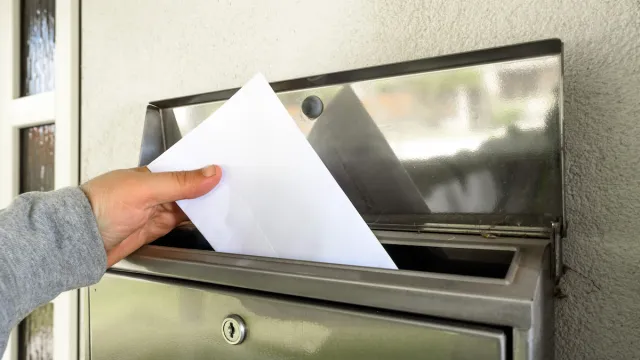USPS Police Issue Warning on Mailing Checks: “No Guarantee It Won’t Be Stolen”

Mail theft is a rising concern among U.S. Postal Service (USPS) customers, as reports of stolen checks and financial fraud continue to run rampant across the country. Data from Fortune indicates that the Financial Crimes Enforcement Network (FinCEN) received roughly 680,000 reports of check fraud in 2022—a 51 percent increase from the previous year.
And while the USPS has implemented safety measures and taken strides to educate the public on how to avoid having their checks stolen, high-ranking officials warn that not even the smartest practices may protect your bank account.
RELATED: USPS Just Issued a New Warning About Mailing Cash.
“Walking your check into a post office is no guarantee that the check is not going to be stolen,” Frank Albergo, the national president of the Postal Police Officers Association, told NBC 7 San Diego.
It’s no secret that mail-related check fraud is a growing epidemic, Albergo noted. The U.S. Postal Inspection Service (USPIS) has made over 1,200 mail theft-related arrests since May 2023, according to the Federal News Network. But as Albergo warned, thieves have become incredibly savvy at altering checks to their benefit. “We’re way beyond check washing,” he confessed.
Kelli is an entrepreneur living in San Diego, who recently fell victim to mail-related check fraud after her thousands of dollars in checks were intercepted by the wrong hands. In an interview with NBC 7 San Diego, Kelli said she wasn’t aware of the accruing theft until Chase Bank notified her of suspicious account activity. A $49.94 check to an energy company had been altered to pay to the order of “Anthony” in the sum of $9,600.
“They altered the checks. They cashed the checks,” Kelli said. Prior to the incident, she’d relied on the dropbox outside her local post office to securely mail checks to pay her bills. “Twice a month I sit down. I know what my bills are. I write them down. I send them out,” she explained.
Kelli had also written two other checks whose total neared $2,500—one to Discover and the other to Chase Mortgage—that were endorsed and cashed by someone named “Sandra.” A fourth check for $4,392 was cashed by a bad actor via Wells Fargo.
As a precaution, Kelli changed her bank account to ward off the thieves from stealing other financial information. Fortunately, with the help of Chase, she got her money back and put an end to the financial nightmare once and for all.
“[I] learned a valuable lesson—don’t write checks and put them in the mail,” she said.
Financial checks are of top value to thieves because they can “wash” them with household chemicals to erase the ink, and consequently, alter who the check is endorsed to as well as the amount, according to Mark Solomon, vice president of the International Association of Financial Crimes Investigators. “Sometimes they can even put some superglue over the signature of the check while washing it, to keep the [original] signature,” he told AARP.
But as Albergo alerted NBC 7 San Diego, thieves are coming up with new methods that don’t include washing: “Now criminals are printing their own checks. They get the information off of a check…and they’re printing checks,” he said.
Per Advance Local, the USPS warned that “the biggest variable enticing these criminals to steal are customers depositing mail into blue collection boxes after the last collection of the day or during Sundays and federal holidays.” Therefore, the agency suggests sending mail via a retail counter for optimal security.